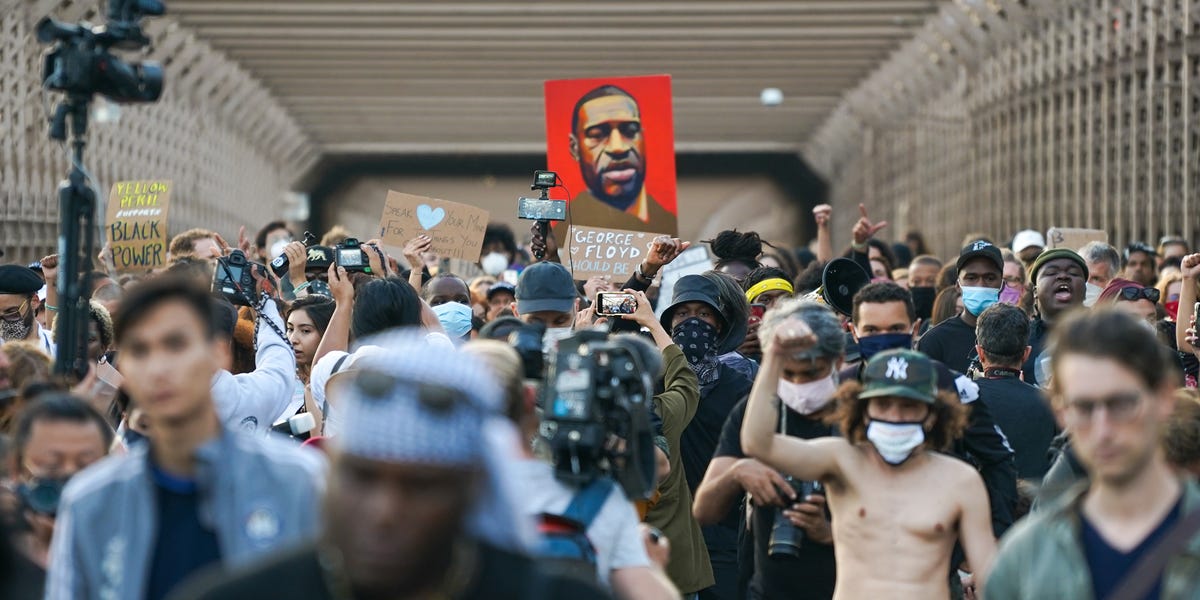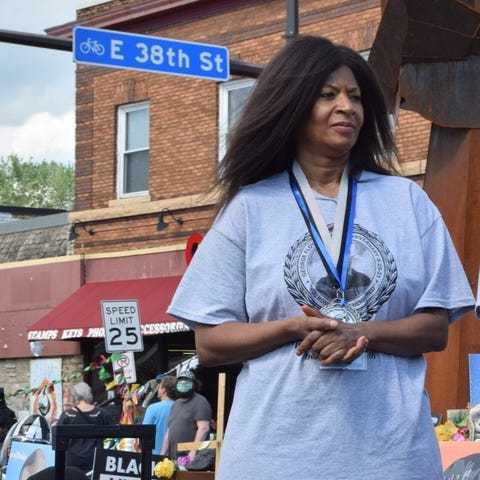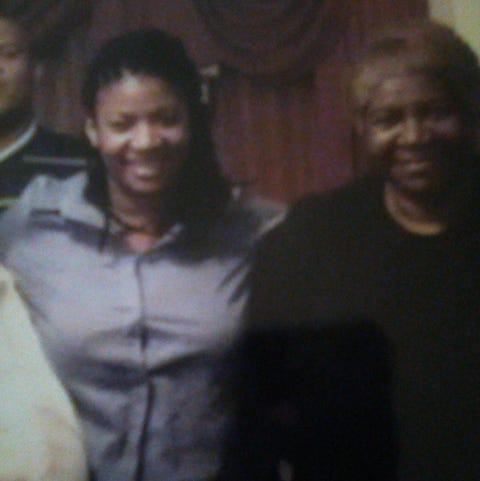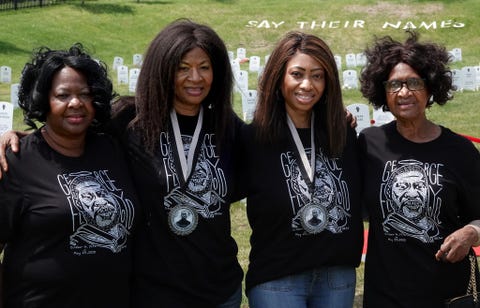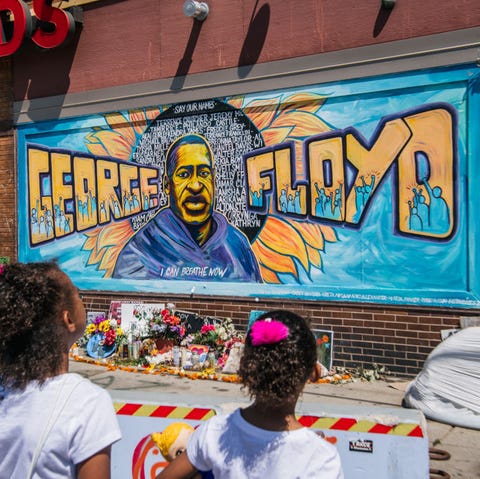In her new memoir Lift Your Voice, Angela Harrelson reflects on the murder of her nephew George Floyd (whom she affectionally calls “Perry”) in Minneapolis and her hope for America to “move in a direction toward racial equality.” Read an excerpt below.
If there is a time for change to happen, for America to move in a direction toward racial equality, it is now, the 2020s. It’s long overdue—it never should have been necessary—but it has arrived. The murder of my nephew Perry put an awareness of systemic racism in people’s minds and hearts. Millions of people have shed their blinders and are looking at the reality of racial profiling with clear, open eyes. Civic leaders are instituting diversity classes for public employees because they want police, firefighters, social workers, clerks to stop judging people by the color of their skin. People are engaging in conversations about race and racism who never gave it a thought five years ago. Members of the generation that is just starting to move up in influence are impatient with racism and willing to change the system, and the Black members of that generation are fierce and won’t take “no” for an answer. This is the time for us to move forward.
I like the way things look right now because so many white people are pouring out their hearts to me, asking what they can do to help. They’re standing alongside us in numbers we didn’t see sixty years ago, protesting and calling for fundamental change.
Some of the truths I put forth are hard, tough truths. But I don’t hate white people, and most of the other Black people I talk with don’t hate white people. We weren’t taught to hate. And the change we seek may not even happen in full during my lifetime. I want to leave a world that’s on the road to being a place where race simply isn’t a consideration for opportunity and advancement: no white privilege, no Black privilege. I want to have a world where I don’t have to hold a sign that says Black Lives Matter. I truly believe that we’re heading toward that world. That hope is beautiful to me, and my vision of a society where equality and respect for all people are taken for granted is a beautiful thing to me.
I’m often asked if the Black community can ever forgive white America for how whites have treated Blacks. We’re already doing that. We’ve been forgiving white people for more than four hundred years. Not everyone is able to forgive, but most Black people are religious, and most religious Blacks are Christian. Forgiveness is a basic tenet of Christianity. Whenever we’ve been hurt or oppressed, we’ve always found a way to forgive and go on. We couldn’t have accomplished what we’ve accomplished and developed our culture as much as we have if we stood still and hated.
Dylann Roof went to a historic Black church in Charleston, South Carolina, in 2015 and shot up a bunch of people studying the Bible, killing nine of them. The story of the murders lasted way past the usual few days because of two things: Roof’s lack of repentance and the willingness to forgive Roof shown by some of the survivors and relatives of people killed that day. Not all the families forgave him, but several did. “We have no room for hating, so we have to forgive,” said the sister of one victim. This is a lesson of the Black church: to remain human in the face of in humanity directed at us.
When you have been treated as property, and after that trauma as a second-class citizen, I think it actually becomes much easier to forgive. We know how it is to be treated as less than equal; we almost expect it. Some of us have loved ones who were killed by white police officers. I have ancestors who were lynched. There are Black people who saw their loved ones shot and killed in front of them, just as their enslaved ancestors saw loved ones killed before their eyes. Black Americans had to accept those things and learn to modify our lives on a daily basis to live with them.
We knew, though, that we could not let our trauma curdle into hate. We have been frustrated and angry—and have displayed that anger and frustration, which is only human. But we always knew that we cannot carry that hate. It is bad enough that we have to carry the attitude that we’re not as good as white people. It is bad enough that we have to carry the wounds, large and small, of systemic racism. And now you are going to add hatred on top of that?
Our goal must be to go forward and bring about change so that our children and their children can have a better life, and we can’t do that with hate. We keep the fight for equality going fueled with forgiveness and love, because what we’re fighting for is about love and acceptance. It doesn’t make sense to fight hatred with hatred. I think white people have trouble understanding this. They have a harder time understanding forgiveness than Black people do because they are members of the privileged race. They haven’t had to deal with systemic racism, so they have a lot less to forgive.
My mom would get frustrated about being poor, and she knew that white people looked down on us and sometimes confronted us with prejudice and disrespect. But she didn’t carry hate in her heart. She just wanted us to keep going, and she would encourage us constantly, saying, “You can do it,” and “You can be anything you want to be. I don’t know how you are going to do it, but keep the faith and don’t give up.” That isn’t a hateful message. Hatred would have just stood in the way. Mom wanted her children to live in a world where no one cares what color you are. After all, God created a diversified world, with all different types of celestial objects, plants, trees, animals, human beings. That’s the world Mom read about in her Bible and wanted to pass on to me, a world that loves what’s different about us as well as what we have in common.
People worry that the activism spurred by Perry’s killing will fade away, and his death will become just another story. I don’t think that will happen. My nephew’s death made an incredible, huge impact on the world; I think, in the long chain of incidents where white police killed Black folks, his death was the turning point. People sent condolences and statements of support from around the world, from places I never heard of. There was an outpouring of pain and grief, along with a sense of “This is where it has to stop.”
When I go to the memorial, I see people crying on each other’s shoulders. They seek comfort and healing, not just for them-selves but for their country. The day Perry died changed the world because for the first time, enough people could not look away and could no longer accept the ways things are. It opened and changed people’s hearts. Dr. King was murdered too, and Nelson Mandela spent decades in prison, but their societies changed because of their sacrifices.
Since Perry’s death, I’ve noticed white people being a little more conscious of Black people’s presence, less likely to not see them. These days, if a white person bumps into me, she’ll say, “Oh,I’m sorry, I didn’t mean to do that,” instead of acting like I wasn’t even there. Or someone will hold the door and let me go through first instead of just assuming I’m going to hold the door for him. I’ve experienced a lot of “After you”—“No, after you” this past year or so.
I feel like there are more white people paying attention now, going out of their way to correct the wrongdoing toward Black America and being more transparent about white privilege. Of course there’s a big difference between being polite and being antiracist, but I have noticed many white people going out of their way to show that we’re on their radar.
You can argue that saying “Excuse me” or “After you” doesn’t mean a white person wants a Black in-law or is more likely to hire a Black person for an office job. On the other hand, you have to start somewhere, and if these white people are just pretending to care about Black people’s feelings, well, you can fake something for only so long. I truly believe there are white people now who have gotten the message from what happened to Perry, and they really are trying to show an increase in consciousness. The people who are putting up a façade will be exposed sooner than later.
Earlier, I wrote about a shopkeeper who didn’t want to let me come into her store late at night. A similar incident happened during the pandemic. My husband and I went to the grocery store, and we found that it was closing early because of Covid. We got there about 7:55 p.m., and the manager said, “Sorry, we’re closing in five minutes.” We said, “Okay, we understand,” and we turned around to leave. Just then, a couple of white people walked by us and headed into the store. My husband said to them, “They’re closing in five minutes. They’re not going to let you in.”
The white guy said, “Yeah, yeah, yeah, yeah, yeah,” as if our experience didn’t apply to him. And they marched right past us into the store. My husband said, “Wait, I bet he gets in.” Sure enough, they were admitted to the store.
The next morning, I called the store manager. I said, “Sir, I’m one of your Black customers. I watched white people welcomed into your store just before closing after my husband and I were sent away. I’m not trying to be a troublemaker, but you need to educate the person who was in charge, because when we saw white people going into your store after we were asked to leave, we felt like he was discriminating against us because we were Black.”
I wasn’t trying to come across as an angry Black woman, and I wasn’t trying to sound like a militant. I just wanted him to know how I felt. I’d like to think I’d have made the same call if I’d been white and had seen Black people turned away. The manager was very polite. He said, “Thank you for telling me. I will talk to the night manager about it.”
That’s the way to handle things. Everybody needs to step up and talk about what they see, because otherwise all these behaviors continue, and nothing changes. The protests are great. It’s wonderful that people are going into the streets and seeking their rights. But on a day-to-day basis, wherever racism happens, whether it’s at work or in the street or in a store or a hospital or anywhere, if we see it, we have to say something. That’s the responsibility that everyone has.
Sometimes—and I realize this is difficult to do—a white person can fight racism by acting against his or her personal interests. Let’s say you apply for a job just for the heck of it; you have the basic skills necessary, but the work will be a stretch for you, with a steep learning curve. Your real hope is that the company will have a lower-level opening. A Black person applies for the same job, and her résumé shows experience that will let her step right into the job and do it well on the first day. You get the job because the HR director and the immediate supervisor think you’re a better “fit” for the company. (It’s well known that people responsible for hiring are better disposed toward people with whom they’re comfortable, and that usually means someone of their own group. That “implicit bias,” as it’s called, may not even be consciously felt.)
It’s hard to turn down a position that pays better and represents a big jump in your career, but that’s the antiracist thing to do to counter the racism (conscious or not) of the hirers. You weren’t expecting to get that job, and the ethical thing to do is ask, “Was mine really the best résumé?” Let them know that you appreciate the offer, but if someone truly qualified was in the running, that’s the person they should hire.
The same goes for assignments within the workplace. If you’re white, and you get the plum assignments, the most interesting ones or the tasks that lead to advancement, while your Black colleague gets the most tedious or insignificant assignments, that isn’t right. It’s your job to say, “Hey, these assignments you’re giving me are great, but Tim deserves some of these jobs to do; he’s just as good at the work as I am.” The truth, if you focus on being fair and treating people equally, you will always win, regardless of your race, your religion, and your sex.
No one today is accusing white people of condoning slavery. In fact, that’s the point: racism is more subtle today than it was in 1865 or 1921 or 1964. It happens in a thousand quiet ways, through voter-suppression laws, through neighborhood gentrification that prices out residents of color, through underfunded, overlooked inner-city schools. Much of the time, it doesn’t even happen in a public setting for all the world to see. But these laws and practices, added to assumptions about race, combine to create a system where racism can survive.
The main thing is to speak up when you see injustice. You can’t remain silent and expect anything to change. The marches and demonstrations are great, but where’s the follow-through? People have to do more than carry signs and banners. Yes, white people are opening the doors, but will they be receptive to the changes that may come because of the doors they opened? And will they stand up to the millions of Americans who still don’t want this change to come?
If Perry could join this conversation, if it had been someone else killed outside the convenience store on that night in May, he’d be talking about community, people coming together to help each other. I think he would say that we all need to get it together and work together as one. Help people when they are down, no matter what race they are. If they need food, feed them. If they need clothes, give them some clothes. And put God first. Perry wasn’t a civil rights activist prior to his death. He was just a Black man who had challenges with his sobriety. But if Perry were still with us, if another man had died the way he did on May 25th, he would be right out there doing the big and small things to fight racism.
From Lift Your Voice: How My Nephew George Floyd’s Murder Changed the World, courtesy of Post Hill Press.
This content is created and maintained by a third party, and imported onto this page to help users provide their email addresses. You may be able to find more information about this and similar content at piano.io
